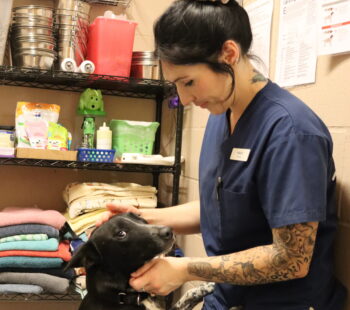Pet Disaster Preparedness

Ann Graves along with HSUS staff and volunteers assisted with a pet food bank and temporary animal sheltering during Hurricane Idalia. Photo by Madison County Sheriff’s Office Animal Services, Fl. September 6, 2023.
For those living in Washington state, we’re all familiar with the potential for natural disasters, from wildfires to earthquakes and even volcanic activity. While you might have emergency kits and an evacuation in place for you and your family, have you considered your furry family members?
Ann Graves, an expert in emergency preparedness and trained responder with the Humane Society for the United States (HSUS) and the American Society for the Prevention of Cruelty for Animals (ASPCA), has seen preparedness plans save pet lives first-hand. As the Board President of the Humane Society for Tacoma & Pierce County, Graves encourages creating an emergency plan to prepare you and your pet for a disaster or for any emergency. Here are some preliminary steps you can take to help keep your family and pets together and safe when disaster strikes:
Update Your Pet’s Information
- Microchip: Make sure your cats and dogs are microchipped. Many other species can be microchipped as well and your veterinarian can assist. Double-check that the microchip registration is in your name and your contact information is up to date. The Humane Society for Tacoma & Pierce County provides low-cost microchips to pets of income-qualifying families. No appointment needed!
- Identification Tag: Make sure your pets are wearing collars with up-to-date identification tags with your phone number. For dogs and cats, a current pet license may be required where you live and is another way to ensure lost animals find their way home.
- Records: Maintain documentation of your pets’ feeding schedules, medical conditions, and behavior needs along with the name and number of your veterinarian. This will ensure you have the information needed in case you have to place your pets in temporary care or boarding.
- Current Photo: Should your pet become displaced, a current photo of you with your pet will be helpful to provide local shelters and to post on local lost and found social media pages as well as around neighborhoods. Having you in the photo will help prove the pet is yours once you find them.
Stock Up on Supplies
Prepare an emergency kit or “go bag” with the following essentials and store it in an easily accessible location in your home.
- Food and Water: Pack at least a five-day supply of food and water for each pet along with bowls and a manual can opener if you are packing canned pet food. Keep an extra gallon of water on hand for use if your pet has been exposed to chemicals or flood waters and needs to be rinsed off.
- Medication: Pack an ample supply of any essential medications your pet is taking. Be sure to routinely check expiration dates and refill as needed.
- Pet Carrier: Include leashes, harnesses, and secure carriers to help transport pets safely. Carriers should be large enough to allow your pet to stand comfortably, turn around and lie down as they may have to stay in it for lengthy periods of time.
- Waste Disposal: Be sure to have cat litter, litter box, litter scoop and trash bags to collect your pets’ waste.
Support Your Local Shelter
When a disaster strikes, local animal shelters are there for the animals in the community and the people who love them. Here are ways you can support your local animal shelter not just in times of crisis, but every day, ensuring the well-being of our furry friends and the dedicated organizations that care for them.
- Adopt or Foster: Whether short- or long-term, opening your heart and home to a shelter pet creates space at the shelter for displaced animals.
- Donate Funds or Wish List Items: Every donation supports the ongoing care for animals in our shelter.
- Volunteer: The shelter simply could not care for the animals in need without the dedication of volunteers who spend countless hours walking dogs, calming cats and keeping up with the relentless baskets of laundry.
- Advocate: Communicate with elected officials and support pet inclusive housing in our communities so that no family is faced with the impossible decision of having to surrender their pet as the only means of having a roof over their head.
Hopefully the need to evacuate in an emergency is few and far between, but it is important to be prepared. By following these steps and supporting your local shelter, you can ensure that your furry family members are prepared for any emergency. Your proactive efforts can make a significant difference in keeping pets and families safely together during challenging times.



